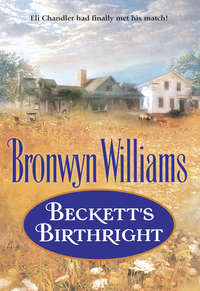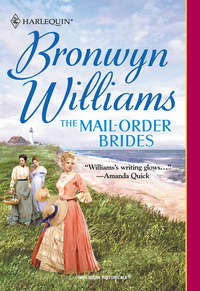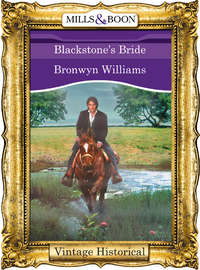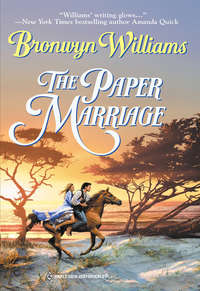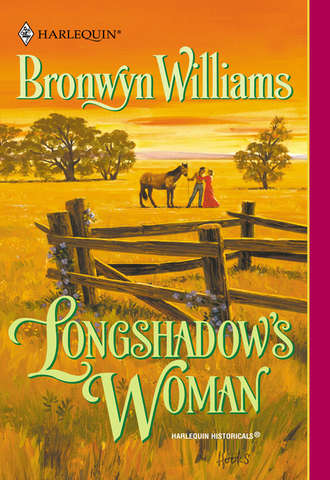
Полная версия
Longshadow's Woman
Carrie slapped the reins across Sorry’s rump, wiped the sweat from her eyes and wished she hadn’t already finished the jar of water she’d brought with her. There’d been creeks along the way where Sorry could drink, but Carrie wasn’t about to get down on her hands and knees and drink beside her mule. She could wait.
But what about her prisoner? She peered over her shoulder to make sure he was still following along behind the cart. It wouldn’t do either of them much good if he passed out from thirst without her noticing and she dragged him all the way home.
Sweat trickled between her breasts. August was so blessed hot! She was worn to a frazzle just from riding. She couldn’t imagine how he must feel, having to walk, especially with those heavy chains around his ankles. If his back itched, he wouldn’t even be able to scratch with his wrists bound together with the lead rope.
Once her conscience started to nag at her, it refused to let up. Finally, when she could bear it no longer, she hauled short on the reins and climbed stiffly down off the high seat. Her left hand was throbbing, her bottom sore as a boil from the oak bench seat, but it was her conscience that bothered her most. It simply wasn’t in her to be cruel to anything, man or beast. The man might be a filthy, thieving heathen, but she hadn’t forgotten what the missionaries had taught her about being a Good Samaritan and doing unto others. She had to admit that even with a sore bottom, she’d sooner ride than have to walk all the way home, swallowing dust.
With a reassuring glance at the rifle, she signaled the man to come forward. Bishop Whittle would have been proud of her. He’d been real big on doing unto the least of them, and all that. A criminal would probably rank pretty far down on his list of leasts, but all the same…
“I reckon it won’t hurt if you ride the rest of the way on the back of the cart.”
If gray eyes could be said to blaze, his did. The words hung there between them, like that long, frayed lead rope. And then the man turned his back on her.
Carrie couldn’t believe it—the arrogant bastard actually turned his back! Indignant at having her good deed thrown back in her face, she snatched up the lead rope and gave it a hard yank. “Don’t you turn your back on me, you sorry, thieving—”
Jonah called on the pride that had brought him so far. The pride that was now battered almost beyond resurrection. Raising his manacled wrists, he jerked on his end of the rope, catching the stupid woman off guard. When she fell forward, landing face down in the dirt, he felt a fierce stab of satisfaction.
Which might be the last thing he felt, he told himself as she lunged up from the road and reached for her rifle. Furious at having been dragged along a public road, he was in a vengeful mood. From under a thatch of matted, vermin-infested hair, he glared at her, making no effort to hide his hatred. This small, drab creature with her sun-reddened nose was not responsible for a single stroke of his ill fortune, but he was in no mood to be reasonable, much less charitable.
They were evenly matched. His hands were bound, his legs in irons, but he was taller, stronger, and far craftier. She was a small woman with one hand wrapped in rags, but she had two distinct advantages. White skin and a Springfield rifle—even though the gun was almost too heavy for her to lift. Braced against the side of the wagon, she could hardly manage to hold it steady, but her eyes never left his. Grudgingly, he allowed her credit for a measure of pride, no matter how foolish.
He was a Kiowa warrior. She was merely a woman.
In the torpid heat of a late summer afternoon, they stood there for one endless moment, linked by misery, frustration and the birth of an awareness neither of them was willing to acknowledge. The mule, as pathetic a creature as Jonah could recall seeing, even here in the east—began to graze on the dried grass at the edge of the road. Jonah told himself he could stand in the middle of the road as long as she could. Unfortunately, he hadn’t eaten in far too long and he needed to make water.
So he did something to break the stalemate. Lifting his head, he closed his eyes and loosed the fierce, wild war cry that had once echoed across the plains.
Startled, the mule threw back its head and brayed, adding to the cacophony. A pair of crows erupted from the top of a dead pine. Jonah had the pleasure of seeing the woman’s face grow pale as milk from a starving cow.
It had been more than ten years since Carrie had heard such a cry. She had almost managed to block it out, to the point of renting a man who was part Indian. Now it came roaring back like a relentless nightmare. On that dreadful night so long ago she had barely escaped with her life. Hundreds of others, including both her parents, had been slaughtered, victims of the Minnesota Massacre, a wild rampage that had lasted more than a week.
Taking two steps forward, she jabbed him hard in the belly with the rifle barrel. “Don’t you ever do that again,” she hissed, as wild color rushed up to replace her pallor. “You can walk till you drop in your tracks for all I care, then I’ll drag you the rest of the way and feed what’s left of your miserable carcass to the hogs!”
Carry didn’t have a hog, but as a threat, it was about the worst she could think of. She only hoped he believed her. Having seen him up close—seen his eyes, which didn’t match the rest of him, even as they simmered with hatred—she was even more conflicted than when she’d stopped to offer him a ride.
The man was a prisoner, she reminded herself. An Indian, no different from the ones who had murdered nearly an entire settlement. He might not have been a part of that particular event, but he’d done something awful, else he wouldn’t have been in jail. Given half a chance, he’d probably wrap the rope around her neck and strangle her.
Just as well she’d had second thoughts about letting him ride with her. She was sorely tempted to turn around and drag him back to the jail. He could rot there for all she cared. The trouble was, she needed him—needed someone, at least, and he was the best she could do. Unless she was willing to wait another year to get her first field planted, it was this man or nothing.
With a show of boldness she was far from feeling, she tested the knot, nodded, and climbed back up in the cart, wincing as she settled her tender backside onto the hard, splintery seat. Her hand throbbed all the way up to her shoulder—she had a hardened criminal on the other end of a rope, and she was just now starting to wonder if she’d have the courage to let him off the leash long enough to do any work.
This might not have been one of her better ideas.
Just before she slapped Sorry into motion again, she turned and glared over her shoulder. “Out of the kindness of my heart, I was willing to let you ride. Well, you flat out used up any kindness I had to offer, so you can just damned well crawl, for all I care.”
As if he could understand a word she was saying. All the same, she said it because it needed saying. At least God, if He happened to be listening, would know her heart was in the right place.
Over her shoulder, she spoke again in a loud voice, enunciating each word clearly. “And just so you don’t go getting any crazy notions, I can shoot the toenail off a one-legged crow at a hundred yards. I’ll shoot you dead if you try to run away, you understand me?”
Jonah understood every word the woman spoke, but he had long since learned the advantage of keeping such knowledge to himself. The woman was weak and foolish. She lied. She was also afraid of him, but Jonah did not make war on women.
Uttering not a word, he weighed his options. He had been away from his farm for twelve days. His horses were pastured. There was grass. There was a creek for water. One of his mares was due to foal soon. He needed to be with her, for she was a foolish animal, but first he must retrieve the deed to his property and the bill of sale for his stock before his parole ended, which would be when the circuit judge arrived. Even then, his chances of convincing a judge of his honesty were low. He had paid for everything he possessed, but there was no way he could prove the money he had used had not been stolen.
Overpowering his captor would be easy, but would accomplish nothing. They’d been traveling somewhat west of north. By now he was beginning to recognize a few familiar landmarks. When they passed the one-lane road that led to his own property, he focused his mind on the thought that one way or another he would reclaim his freedom. He had not come this far and survived this much to give up now. He had no way of knowing where the woman was taking him, but he knew it could not be too much farther. She had not brought along food.
So he walked behind the cart, breathing in the sweet, dusty air of freedom. While his mind turned over various ways he might prove his innocence, his gaze rested on the straight, narrow back of the woman. When she lifted her ugly straw hat he saw that her hair was thick and pale and shorter than his own. Only children had hair so short. She was not a child, but she was young. Even with two good hands she would be no match for the willful mule. The mule knew it. The woman still held onto her illusions.
He studied her bandaged hand and wondered how grave the injury was. Though her arms were pink, he thought it was from the sun, not the telltale signs of an inflammation streaking up from under her wound. He had seen people die from such an inflammation.
Jonah didn’t particularly want his captor to die. He had heard the jailer tell her she must feed him. By remaining her prisoner now, he could build his strength and have a far better chance of escaping.
Shortly before they turned off the main road, she stopped to allow the mule to drink from a broad creek, beckoning for him to do likewise. He refused to be grateful, even when he was able to use the opportunity to step behind a massive gum tree and relieve himself. When the rope between them pulled even tighter so that he could barely lift his hands, he muttered under his breath. His trousers securely buttoned again, he moved back into the clearing just as the woman emerged from behind another tree, adjusting her skirt. For reasons he didn’t even try to understand, Jonah felt like laughing.
She had turned off the main road a mile back, following a smaller road until they turned off once more. Jonah fixed in his mind the landmarks. Eventually they came into a clearing. Passing by a cabin that was scarcely larger than his jail cell, she stopped outside a barn that looked as if it would take only one hard wind to collapse.
“You’ll sleep in there.” She pointed first at the prisoner and then at the gaunt, tin-roofed structure with a collapsed shed at one end.
Jonah could have told her he would be far more comfortable sleeping out under the stars, but that would require speaking her language. Silence could work to his advantage. He was still attached to the cart, though he could easily have freed himself, but to what end?
Instead, he waited for the woman to unhitch the mule. When she turned to look at him, a frown on her face, he saw that she was even younger than he had first thought. Turning abruptly, she picked up a stick, marched across the clearing and drew a line in the dirt surrounding the house. Turning back, she said, “I’m going to untie you now, but you’re not to step over this line, you hear?”
To emphasize her words, she pointed to him, then to the house, and shook her head vigorously. “Not go to house? Do—you—understand?”
He understood lines. The U.S. Government drew lines in the earth and called them reservations. Jonah would not cross her line. Wooden houses stifled him. They were ugly and drafty and too often smelled of unwashed bodies. Bitterness coloring reluctant amusement, he nodded solemnly.
“Then I reckon we’d better get you settled first and then see about cleaning you up. I don’t hold with fleas and lice, not even in the barn.”
Jonah would rather not “hold with” them, either, given a choice. He could feel the miserable devils crawling on his scalp and the skin of his groin. At this moment, he couldn’t have said who he hated more, the man he’d been forced to become, or the woman who reminded him of it.
Chapter Two
Carrie led her prisoner to the barn holding her rifle under one arm, with the lead rope wrapped around the wrist of her bandaged hand. Inside, it was barely light enough to see, but she didn’t dare put down the rope or the rifle in order to light the lantern. The man glanced around, his gaze going immediately to the new stall Darther had had built for his gelding. There was a cot just outside the slat wall where Liam slept when they were here. According to Darther, Liam, who usually reeked of whiskey and lineament, was both jockey and trainer. So far as Carrie was concerned, he was just another mouth to feed. She liked him no better than she did her husband, but evidently, he was part of the bargain.
So when the prisoner moved toward the cot, she jerked on his rope. “Not there,” she said, and then swore because talking to a heathen was like talking to that blasted mule. Neither of them understood a word she said.
Grabbing a hoe, she scratched a line in the earthen floor, dragging him with her as she moved. Then she pointed to the line and shook her head, indicating that he was not to go beyond the mark.
When he nodded his head she decided the poor wretch was not entirely without understanding. Next she would have to fix it so he could go outside to relieve himself without being able to run away. The privy would have to wait until she could think of a way to give him more slack. Rope was no solution. Even without a knife he could hack through it the minute her back was turned, using any of several rusted, broken implements lying around the barn.
He could simply jerk the end from her grasp, come to that. The rifle was all that kept him from freeing himself and taking off into the woods. Which meant that she was going to have to keep it nearby at all times.
Selecting a length of chain from among several hanging on the wall—hoping there were no weak links—she secured her prisoner by padlocking one end to his leg irons and the other to the hasp on the open barn door. Having to hold the heavy rifle and work with her good hand was an awkward, not to mention painful, process, but at least he had the freedom to step outside when he needed to.
“There now, I reckon that ought to do it, long’s you don’t trip over the chain,” she said, and then shook her head because it was useless, trying to talk to him. Which reminded her that she still had Sorry to deal with.
Throughout the entire process the man hadn’t uttered a sound, but his eyes had followed her every move. She almost wished he would complain, even if she couldn’t understand what he was saying. He was beginning to remind her a little too much of the starving pup that had turned up at her back door one day last winter. One look and she’d lost her heart. Shaggy tan fur, big golden eyes, just begging to be loved.
Begging to be fed, more likely, but she’d taken him in and made a fool of herself, crooning, whipping up the eggs and buttermilk she’d been saving for a big pan of cornbread. The miserable mutt had lapped the bowl clean, spattering goo all over her floor. Then he’d peed, snapped at her hand, and run right between her legs and out the door, leaving fleas, dog hair, and a mess for her to clean up.
That poor wretch in her barn looked as if he hadn’t eaten in weeks. If anything, he was even dirtier than the pup had been, and while his eyes were gray, not yellow, they sure as shooting weren’t begging for love. She couldn’t afford to get softhearted, not when she was dealing with a hardened criminal.
Chained to the wall, Jonah watched her leave. Then he lifted his head, closed his eyes and swore fluently in three languages. He’d have done better to have gone back to the damned reservation instead of trying to make a new life for himself here in the East.
Closing his mind to the weight of the heavy leg irons, he tested the extent of his freedom, moving around the cluttered barn, studying the selection of tools available. All were rusted. Most were broken, but useful enough for his purposes. The woman was a fool. Perhaps he’d been a bigger fool not to have tied her up with her own rope, dug the key from her pocket and escaped.
Choosing a short length of baling wire, he set to work sharpening it to a fine point on the grindstone. The locks were ancient. Two twists of the sharpened wire and the first popped open, and then the second. He removed the hinged iron bands from his ankles and examined the raw and bleeding flesh. She had offered to let him ride on the back of the cart. Proudly, he had refused, but pride would be poor comfort if his feet rotted and fell off.
When he heard the cabin door open and close, he moved swiftly. By the time the woman appeared, he was back in irons, sitting meekly on a pile of straw. At least it was clean straw. Dusty, but with the sweet smell of the meadow, not like the straw pallet in his jail cell that had reeked of things he’d rather not think about.
“I brought you something to eat and a blanket.” Her voice sounded more hesitant now that she’d left her rifle behind. From the open doorway she eyed him warily before kneeling to place a thin woolen blanket and a plate of cornbread glistening with drippings just inside the door. “And here’s a bucket of water.” She reached behind her and swung the rusted pail inside. “You can drink your fill and wash with what’s left. Tomorrow I’ll take you down to the creek and you can scrub.”
She’d forgotten to mime and speak in those insultingly loud, single-syllable words. Not that she didn’t still treat him as if he were of somewhat lesser intelligence than that miserable mule of hers. Which, he thought with bitter amusement, was probably true.
Without moving, he continued to stare back at her through the fast fading light. She was small for a woman, lacking the soft layer of flesh most women kept even in the starving times. Under the shapeless garment that hung from her shoulders, she appeared more child than woman. Either way, it made little difference, as both were capable of inflicting cruelty on anyone they perceived as being different.
The smell of fresh cornbread and bacon drippings knotted his gut painfully. His belly hadn’t been filled since he’d been taken from his own land, but he’d be damned before he would shame himself by crawling in the dirt and falling on her bread like a starving animal.
“Well.” She hesitated, as if reluctant to leave. He wanted to shout, Go, woman! Leave me one small shred of dignity! “We’ll start pulling stumps come morning. I’ll bring you more food and show you where the creek is so you can bathe first. Um…the blanket. I know it’s hot now, but it gets cool just before morning.”
He made a sound in his throat that was something between a curse and a growl. It served the purpose. The woman fled, and he felt like laughing. Only, he felt more like weeping.
She had not brought him a cup. He scooped water from the bucket with his hands, then gave up and drank directly from the pail and poured the rest over his head. The bread was good, almost as good as that he remembered from his youth.
His youth…
Lying back on the bed of straw, his belly uncomfortably full, Jonah Longshadow stared up at the hayloft overhead and wondered at the curious pathways that had led him so far from his lodge on the banks of the Red River. He had come into this world a part of two distinct cultures, unwanted by his father, a white soldier who had raped his Kiowa mother. As a child he had often been taunted by other children for his white blood. As a youth he’d been watched by his elders. He had felt compelled to prove himself by counting coup on the enemies of his mother’s people. Increasingly bold, he had cheated death many times, for as a warrior, he was fearless, having little to lose.
But as a horse gatherer, he excelled most of all. By the age of eighteen, he was spending most of his time raiding the wild herds that roamed the area. Four years later, in the spring of 1875, he had just returned to his lodge after a week spent stalking a notorious ridge runner, a magnificent stallion that kept watch over his mares from the high ground. That night soldiers from Fort Sill had swept through, rounding up every warrior in the territory. Jonah, whose name had not been Jonah then, had been taken along with more than seventy others.
Pride had kept him from pleading his case, for as a warrior, he had worn the red cloth sash of the tribe’s elite Koitsenga—the Society of the Ten Bravest. Along with the other men, he had been put in chains and dispatched to Fort Sill. There, they had been placed in an unfinished icehouse and thrown chunks of raw meat once a day until they were eventually transported by way of wagon and railroad to Saint Augustine in Florida. Expecting to be executed once he reached his destination, Longshadow had instead been sentenced to indefinite imprisonment. The difference had seemed slight at the time, but that was before he met Lieutenant Richard Henry Pratt.
Pratt was like no other white soldier in Longshadow’s experience. The man had fought against the Kiowa, yet he bore no malice, choosing to educate his prisoners rather than punish them for defending their homeland. He’d had the prisoners construct their own barracks, then moved them out of Fort Marion’s dungeons. Putting them to work as bakers, sailors, fishermen and field laborers, he had even allowed them to keep their small wages. During the time when they were working on their barracks, he’d enlisted the help of a few white women to teach them to read, write and speak English.
Warily at first, but with increasing eagerness, Longshadow had allowed himself to be taught. Somewhat to his astonishment he’d discovered that he was a fair scholar, partly because of an insatiable curiosity, and partly because he had recognized education as a powerful tool. With the world around him changing so rapidly, a man needed all the knowledge he could absorb in order to survive.
After three years, Lieutenant Pratt had persuaded his superiors that the prisoners were firmly reconciled to the white man’s way. They had been granted their freedom. Most had returned to the reservation, but a few of the once-fierce warriors had elected to stay in the East.
Longshadow had been among those who elected to stay. His mother was dead. If he went back, he’d be expected to live on the reservation with its invisible borders. The Kiowa way of life was finished. From his tutors he had learned about the Jesus Road and the Plow Road. The first he hadn’t understood; the second held no appeal. Instead, he had chosen the sea. Over the next few years he had saved the money he earned as a seaman, recognizing the power of the white man’s gold, for even then a dream had been growing inside him. A dream of one day breeding fine horses. But it would take more gold than he possessed, which meant more years of work until he could save up enough to buy breeding stock and the land on which to keep them.
As a prisoner he had sailed for a company that traded in the West Indies. Upon receiving his full pardon, he had returned to the sea, for of all the options, that one was most acceptable. Life at sea reminded him of the past, when his world had been wild, free and vast. And although he read, wrote and spoke English, he kept that knowledge to himself, having quickly discovered that most of his crewmates resented an Indian who spoke their language more precisely than they did. Although he liked Pratt, and would trust the man with his life—had done as much—he found it hard to trust other whites.
So after promising to return the favor by helping some white person in need, he arranged with Pratt to collect his pay directly from the ship owner and deposit it into an account in Longshadow’s name. Each time he returned to port, Pratt gave him an accounting, congratulating him on his good sense. While other members of the crew drank and gambled away their pay almost as quickly as they earned it, Jonah watched his savings grow. He studied the written account from the bank, visualizing the horses he would one day buy—a good stallion and two, possibly three sturdy mares.


